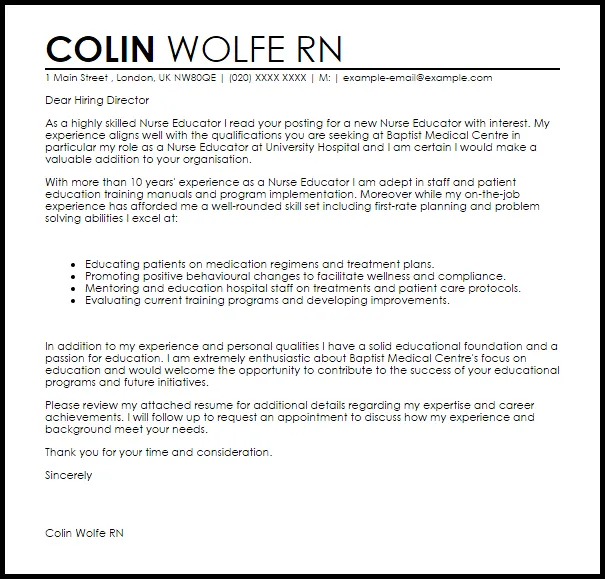The Importance of a Cover Letter for Nursing Instructors
A well-crafted cover letter is your first chance to make a positive impression on a potential employer. For nursing instructors, it’s not just a formality; it’s a crucial tool for showcasing your unique qualifications and passion for nursing education. It provides context to your resume, allowing you to elaborate on your skills, experiences, and teaching philosophy in a way a resume alone cannot. A compelling cover letter can significantly increase your chances of securing an interview, setting you apart from other applicants. It is a direct communication, highlighting how your experience and values align with the institution’s needs and culture. In a competitive job market, a strong cover letter is often the deciding factor in whether your application moves forward.
Understanding the Nursing Instructor Role
Before you start writing, understand the responsibilities of a nursing instructor. This role goes beyond clinical practice; it includes curriculum development, student evaluation, and fostering a learning environment. Nursing instructors must possess strong communication, critical thinking, and leadership skills. They need to be adept at conveying complex medical information and inspiring students to excel. They bridge the gap between theoretical knowledge and practical application, guiding future nurses through their academic journey. Understanding the expectations of the role allows you to tailor your cover letter, emphasizing how you meet the specific demands of the position.
Key Skills and Qualifications to Highlight
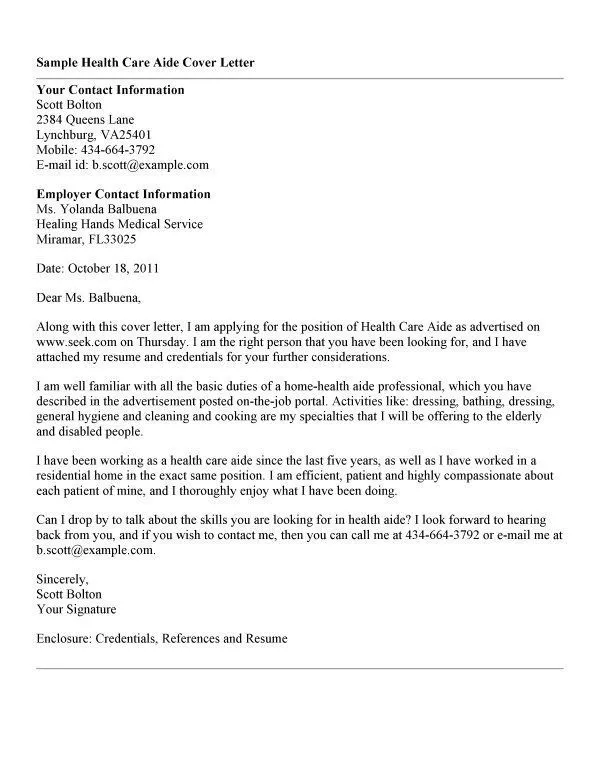
Focus on skills and qualifications that directly align with the job description. Highlight your education, clinical experience, and teaching experience. Emphasize your ability to communicate effectively, manage a classroom, and assess student performance. Include any certifications or specializations relevant to the nursing program. Demonstrating your understanding of current nursing practices and educational methodologies is crucial. Tailor your cover letter to the specific requirements listed in the job posting, showcasing how your skills and qualifications meet the institution’s needs. Quantify your achievements whenever possible to make a more impactful case.
Education and Certifications
Clearly state your educational background, including degrees, institutions, and graduation dates. Specify any certifications you hold, such as a Certified Nurse Educator (CNE). Mention any advanced degrees, such as a Master of Science in Nursing (MSN) or a Doctor of Nursing Practice (DNP), as they are highly valued. Ensure that your education and certifications are relevant to the position and meet the requirements outlined in the job description. Don’t forget to include any continuing education courses or professional development activities that demonstrate your commitment to staying current with nursing practices and educational techniques.
Clinical Experience
Provide details about your clinical experience, including the type of nursing, setting, and duration. Highlight your experience in areas relevant to the nursing program, such as medical-surgical, critical care, or pediatrics. Showcase your ability to provide quality patient care, collaborate with healthcare teams, and make critical decisions. Mention any specialized clinical skills or procedures you have mastered. Emphasize your ability to translate clinical experience into effective teaching strategies that prepare students for real-world nursing practice. Provide concrete examples of patient outcomes you have influenced.
Teaching Experience
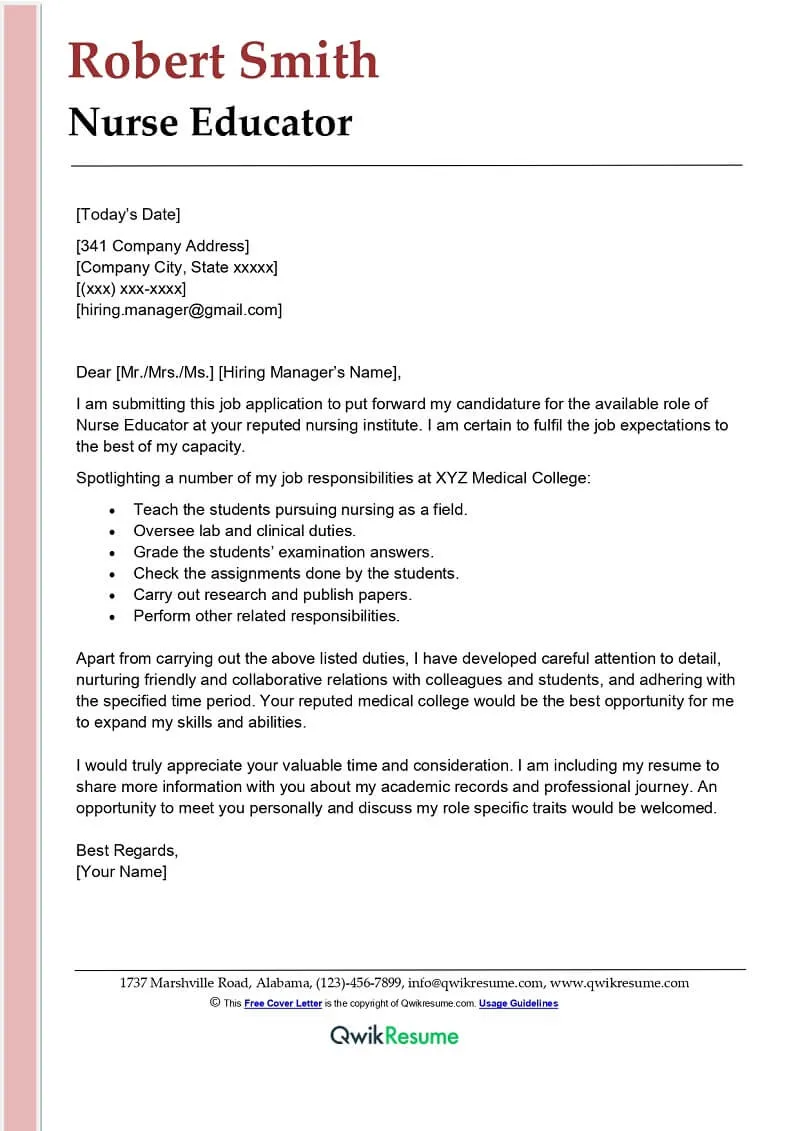
Describe your previous teaching experience, including the courses you taught, the student populations, and the teaching methodologies you employed. Highlight your experience in curriculum development, lesson planning, and assessment creation. Showcase your ability to create engaging and effective learning experiences for students. Mention any teaching awards or recognition you have received. Demonstrate your proficiency in using educational technologies and fostering a positive learning environment. Provide specific examples of how you have improved student outcomes. Tailor this section to match the responsibilities outlined in the job description.
Leadership and Communication Skills
Emphasize your leadership abilities and communication skills. Nursing instructors must effectively communicate complex information, manage a classroom, and lead students. Showcase your ability to mentor, motivate, and guide students. Mention any leadership roles you have held, such as charge nurse or committee chair. Provide examples of how you have resolved conflicts, facilitated teamwork, and fostered a positive learning environment. Your communication skills include your ability to listen actively and tailor communication strategies to different learning styles, making complex concepts accessible to all students.
Formatting Your Nursing Instructor Cover Letter
Proper formatting is essential for making a professional impression. Your cover letter should be easy to read and visually appealing. Use a standard font like Times New Roman or Arial in a size between 11 and 12 points. Maintain consistent spacing throughout the document. Ensure your cover letter is no more than one page long. Use clear headings and bullet points to organize information. A well-formatted cover letter reflects your attention to detail and professionalism, making a positive impact on the hiring committee.
Contact Information and Date
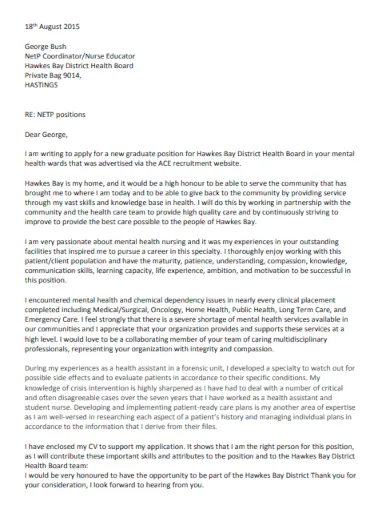
Include your full name, address, phone number, and email address at the top of your cover letter. Ensure your email address is professional. Include the date you are submitting the cover letter. Be sure the contact information is accurate and up-to-date so the employer can easily reach you. Proper contact information ensures they know how to follow up with you.
The Salutation
Address the hiring manager by name whenever possible. Research the institution to find the hiring manager’s name, and use it in your salutation. If you cannot find a name, use a professional greeting such as “Dear Hiring Committee” or “Dear [Department Name] Search Committee.” Avoid generic salutations such as “To Whom It May Concern” as they make your letter feel impersonal. A personalized salutation demonstrates that you’ve done your research and are genuinely interested in the position. Double-check the spelling of the hiring manager’s name.
Crafting a Compelling Opening Paragraph
Your opening paragraph is critical for grabbing the reader’s attention. State the position you’re applying for and where you saw the advertisement. Briefly explain why you are interested in the position and the institution. Highlight your key qualifications and the value you bring to the role. Make a strong first impression that captures the hiring manager’s interest and encourages them to read the rest of your cover letter. Show your enthusiasm and commitment right from the start, setting the tone for a compelling application.
Highlighting Your Key Qualifications and Skills
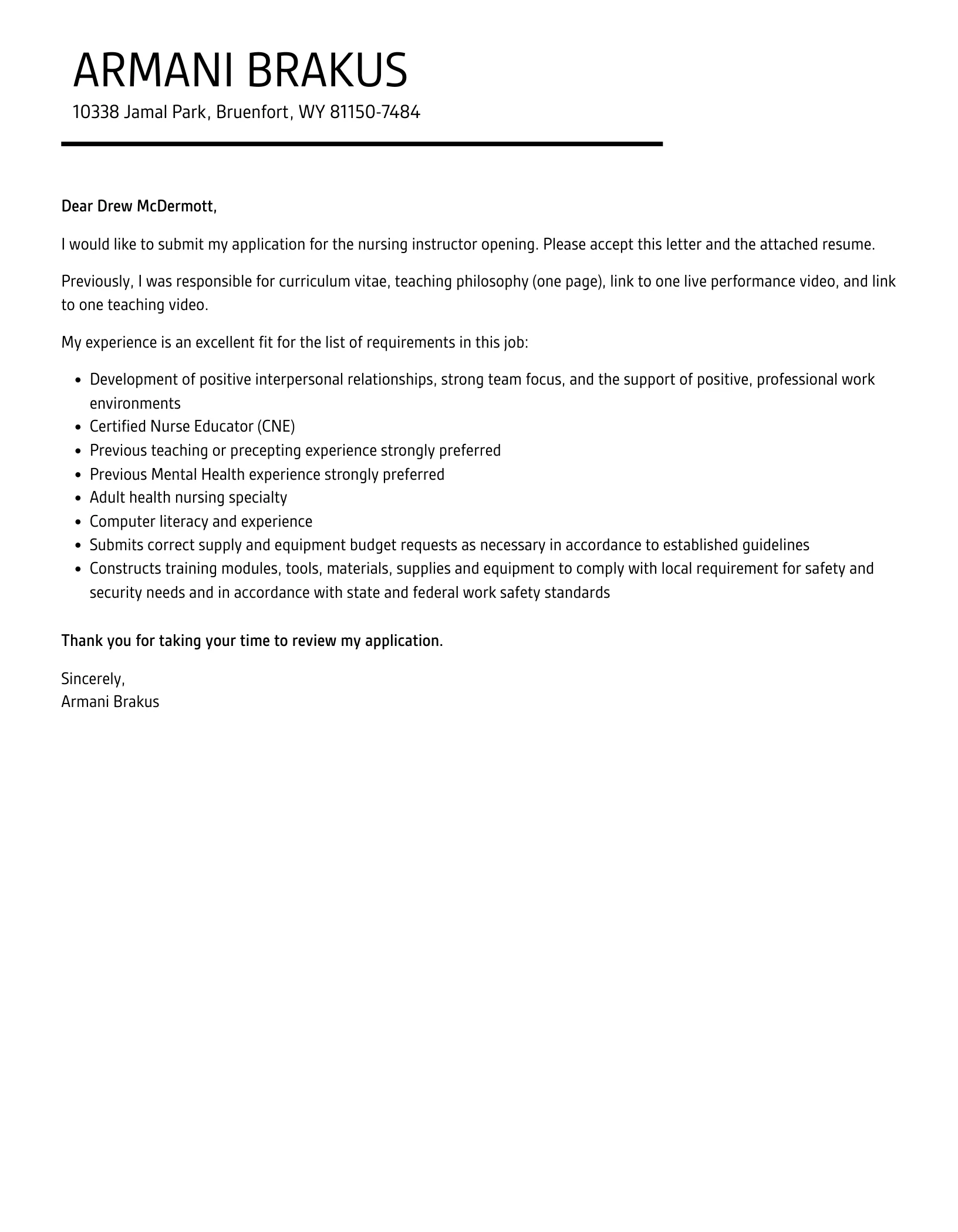
The body of your cover letter should expand on the skills and qualifications listed in your resume. Provide specific examples that demonstrate your abilities and achievements. Quantify your accomplishments whenever possible. Tailor your cover letter to the specific requirements of the job description. Use keywords from the job posting to help the hiring manager quickly identify your suitability for the role. Show how your skills align with the needs of the institution, demonstrating a clear understanding of the role and the challenges involved.
Showcasing Your Teaching Philosophy
Nursing instructors must have a clear teaching philosophy that guides their approach to education. Briefly explain your teaching style and how you create an effective learning environment. Highlight your approach to student engagement, assessment, and curriculum development. Describe how you motivate students, adapt to different learning styles, and promote critical thinking. Show your commitment to fostering a supportive and inclusive classroom. Align your teaching philosophy with the institution’s mission and values, demonstrating a strong cultural fit.
Demonstrating Your Passion for Nursing Education
Express your passion for nursing education throughout your cover letter. Explain why you enjoy teaching and what motivates you to help future nurses succeed. Share any personal experiences that highlight your commitment to nursing education. Demonstrate your enthusiasm for the institution and its mission. Show how you plan to contribute to the nursing program’s goals and student outcomes. Make the hiring manager believe you are the ideal candidate, who has the vision to transform education.
Closing Your Cover Letter Effectively
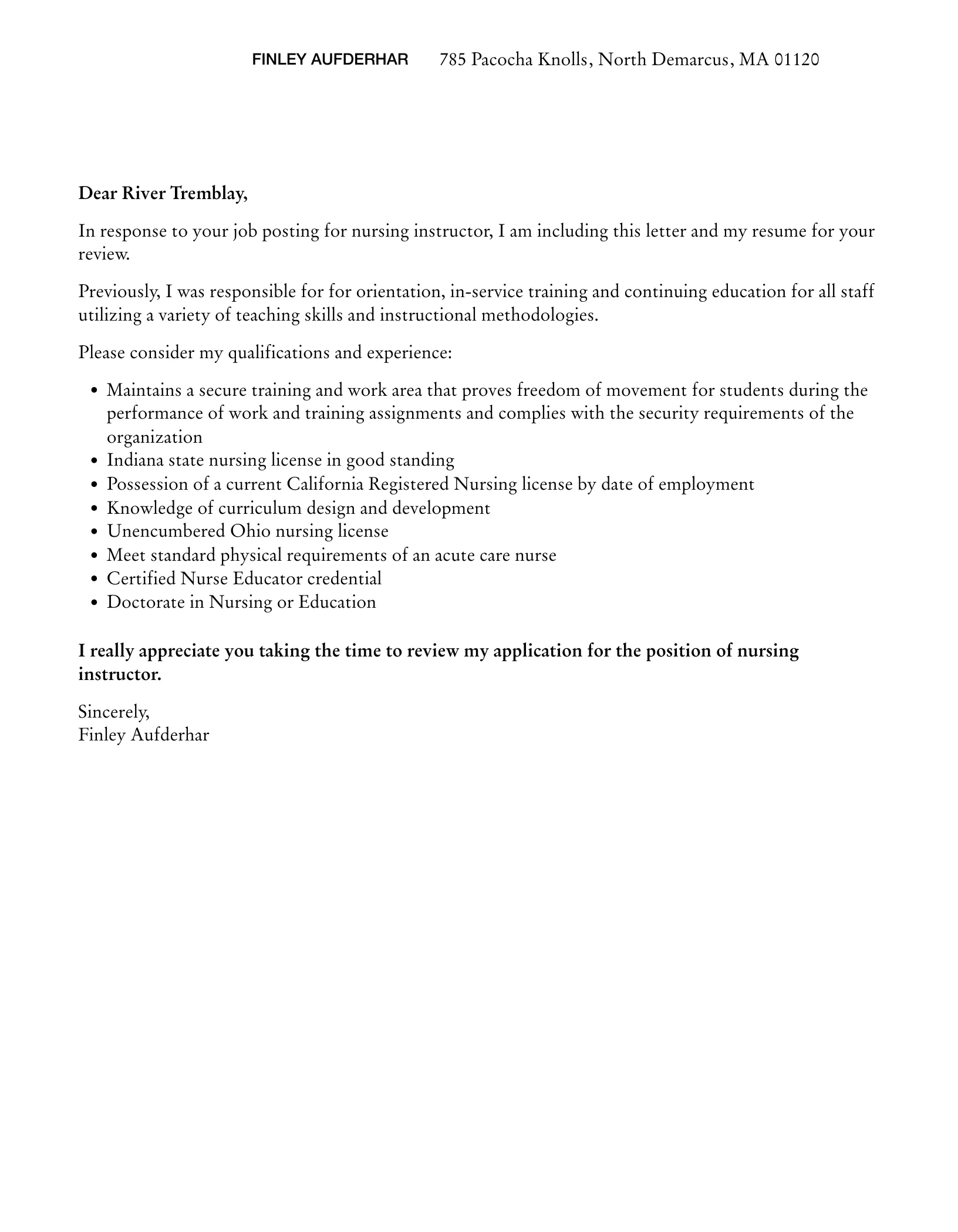
Your closing paragraph should summarize your key qualifications and reiterate your interest in the position. Thank the hiring manager for their time and consideration. Reiterate your desire for an interview and include a call to action, such as encouraging them to contact you. Express your confidence in your ability to contribute to the institution’s success. End with a professional closing, such as “Sincerely” or “Respectfully,” followed by your typed name. Your closing paragraph should leave a lasting positive impression, encouraging the employer to move your application forward.
Expressing Gratitude and Next Steps
Thank the hiring manager for their time and consideration in your closing paragraph. Express your appreciation for the opportunity to be considered for the position. Reiterate your availability for an interview and provide your contact information. Mention any additional materials you have included, such as a portfolio or letters of recommendation. Clearly state your next steps and the best way for the hiring manager to contact you. Demonstrating professionalism and gratitude leaves a positive lasting impression.
Proofreading and Editing Your Cover Letter
Proofread your cover letter meticulously for any grammatical errors, spelling mistakes, or typos. Check for clarity, conciseness, and overall coherence. Read your cover letter aloud to ensure it flows smoothly and is easy to understand. Ask a friend or colleague to review your cover letter. A well-edited cover letter shows attention to detail and professionalism, which are essential qualities for a nursing instructor. Ensure your cover letter represents you in the best possible light and conveys a positive message.
Common Mistakes to Avoid
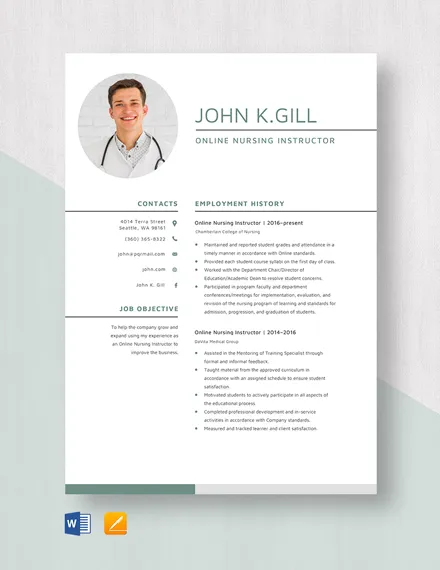
Avoid common mistakes such as generic language, typos, and grammatical errors. Do not simply copy and paste a template without tailoring it to the specific job and institution. Avoid exaggerating your qualifications or making false claims. Do not use jargon that the hiring manager may not understand. Do not write a cover letter that is too long, as one page is the ideal length. Avoid negative language or criticizing previous employers. Making a cover letter that’s personalized will make the difference.
Length and Tone Considerations
Keep your cover letter concise, ideally one page in length. Use a professional and enthusiastic tone throughout the letter. Maintain a positive and confident attitude. Avoid sounding overly casual or informal. Tailor your tone to the specific institution and the requirements of the job. Ensure your writing style reflects the professionalism and values expected of a nursing instructor. The tone should mirror your passion, allowing your personality to shine through, making your application memorable.
Tailoring Your Cover Letter
Customize your cover letter for each position you apply for. Always tailor your cover letter to the specific job requirements and the institution’s needs. Research the institution and its values and mission. Highlight how your skills and experience align with the institution’s goals. Use keywords from the job description throughout your cover letter. Demonstrating your understanding of the institution and the role shows you’ve invested time and effort in your application, significantly increasing your chances of getting hired. A customized cover letter demonstrates genuine interest and greatly enhances your chances.
Researching the Institution
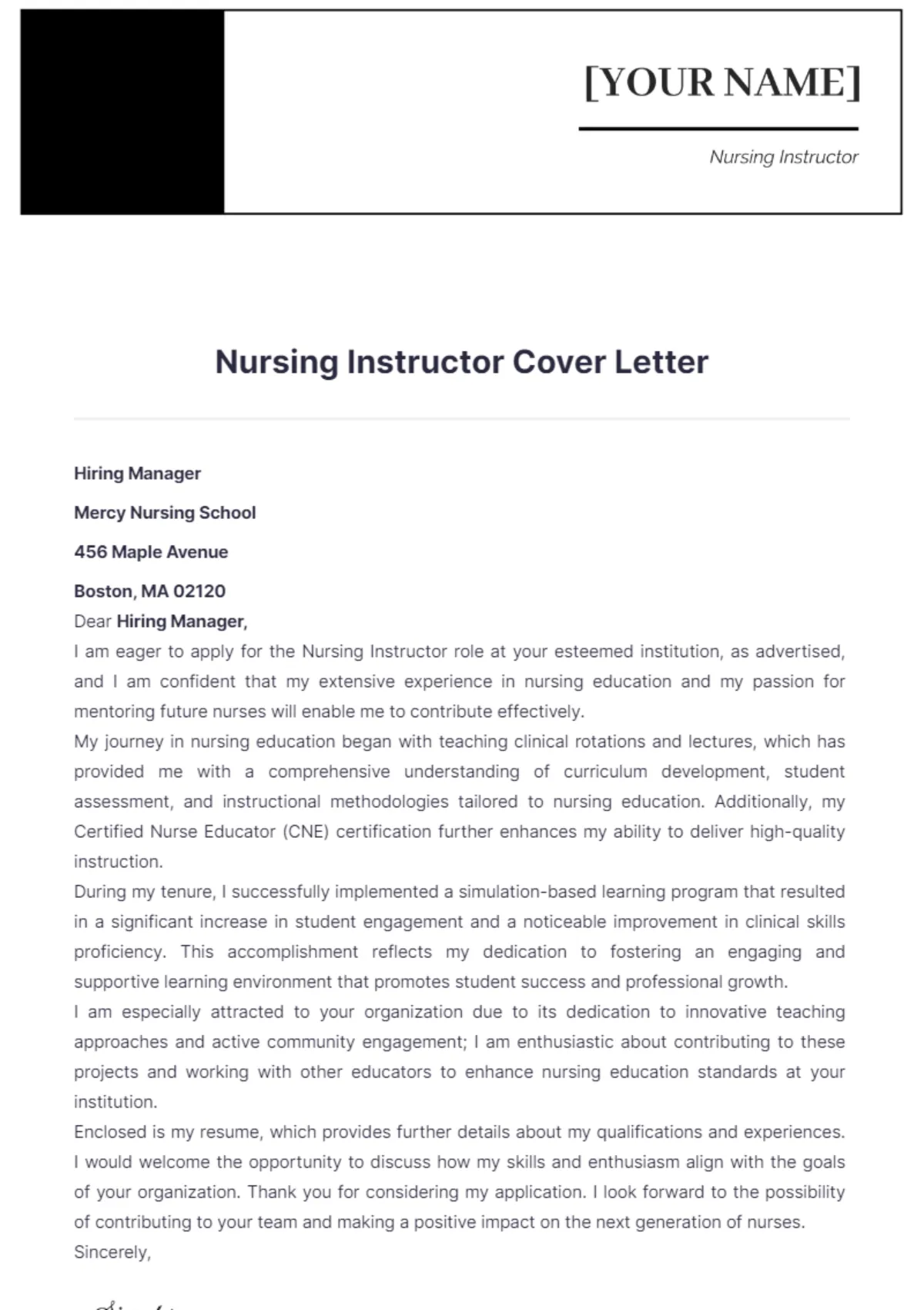
Before writing your cover letter, research the institution thoroughly. Visit the institution’s website to learn about its mission, values, and goals. Review the nursing program’s curriculum and teaching methodologies. Identify any specific needs or initiatives the institution is undertaking. Understanding the institution allows you to tailor your cover letter to its specific needs and demonstrate a genuine interest in the role and its culture. Researching the institution helps you highlight how your values, experiences, and skills align with their specific needs.
Customizing for Each Application
Do not use a generic cover letter for multiple applications. Customize your cover letter for each specific job and institution. Modify the language, skills, and experiences you highlight. Tailor your letter to match the specific requirements outlined in the job description. Mention specific projects, initiatives, or values that align with the institution’s mission. Personalizing your cover letter shows that you are genuinely interested in the position and have done your research. Ensure you are adapting the content to the particular requirements of each job application.
Following Up After Submission
After submitting your application, follow up with the hiring manager. Send a brief email or make a phone call to express your continued interest. Reiterate your qualifications and enthusiasm for the position. Thank the hiring manager for their time and consideration. If you haven’t heard back within a reasonable timeframe, follow up again. Following up demonstrates your professionalism and proactive approach, which can make you stand out from other candidates. Following up shows your genuine interest in the position, and that you are serious about working with them.
